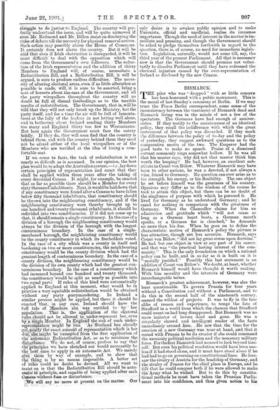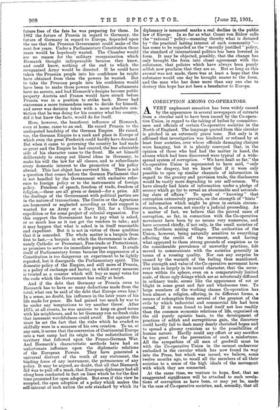BISMARCK. T HE pilot who was " dropped " with so
little concern has been honoured with a public monument. This is the moral of last Sunday's ceremony at Berlin. If we may trust the Times Berlin correspondent, some sense of the inconsistency between the treatment of Bismarck dead and Bismarck living was in the minds of not a few of the spectators. The Germans have had enough of anniver- saries. If they testify to the maintenance of an identical. policy, they recall the indifference with which the great instrument of that policy was discarded. If they mark the difference between the policy of to-day and the policy of yesterday, they suggest awkward questions as to the comparative merits of the two. The Emperor had the good taste to make no speech. Praise of a dismissed servant commonly rings somewhat hollow. If he was all that his master says, why did not that master think him worth the keeping ? He had, however, an excellent sub- stitute in Count von Billow. Whatever Bismarck may have been to other nations, he was a devoted, if not always a wise, friend to Germany. No question can ever arise as to his strength, his energy, or his flexibility. The one object he set before himself was the greatness of his country. Opinions may differ as to the wisdom of the course he took to attain this objeet, but there can be no doubt of the singleness of purpose With which he pursued it. He lived for Germany as he understood Germany ; and he cared for nothing in comparison with the greatness of Germany. When the Chancellor claims for him an admiration and gratitude which "will not cease so long as a German heart beats, a German mouth speaks, or a German fist is clenched," he demands no, more than his clue. When he goes on to define the characteristic motive of Bismarck's policy the picture is less attractive, though not less accurate. Bismarck, says Count von Billow," did not lay great stress upon doctrine." He had but one object in view at any part of his career, and that was "the practical lasting interest of the com- munity." This is the only foundation on which a rational policy can be built, and in so far as it is built on it is "morally justified." Possibly this last statement is an addition of Count von Billow's. We doubt, at least, whether Bismarck himself would have thought it worth making. With him morality and the interests of Germany were interchangeable terms.
Bismarck's greatest achievement, however, was also the least questionable. To govern Prussia for four years without a Constitution and without a Parliament, and to do this in the second half of the nineteenth century, seemed the wildest of projects. It was to fly in the face alike of reason and experience, to tempt the fate of Strafford in a world from which the chances that Strafford could count on had long disappeared: But Bismarck was no mere imitator of heroes dead and gone. He was a singularly shrewd and intelligent reader of the facts immediately around. Iim. .He saw that the time for the creation of a p.ew Germany was near at hand, and that it rested with Prussia to be its creator if she could command the necessary political resolution and the necessary military force. For the first Bismarck had no need to look beyond him- self. But even his political resolution would have been use- less if it had stood alone, and it must have stood alone if he had had to go on governing on constitutional lines. He fore- saw the rivalry of Austria for the headship of Germany, and the rivalry of France for the chief place in Europe, and he felt that he could conquer both if he were allowed to make theArmy, what he wished: But to do this by constitu- tional methods he Must have taken the Prussian Parlia- ment into his confidence, and thus given notice to his future foes of the fate he was preparing for them. In 1862 the future of Prussia in regard to Germany, the future of Germany in regard to Europe, depended upon the use that the Prussian Government could make of the next few years. Under a Parliamentary Constitution those years would be hopelessly wasted. The Chamber would see no reason for the military reorganisation which Bismarck thought indispensable because they knew, and could know, nothing of the end to which the reorganised Army would be directed. If he could have taken the Prussian people into his confidence he might have obtained from them the powers he wanted. But to take the Prussian people into his confidence would have been to make those powers worthless. Parliaments have no secrets, and had Bismarck's designs become public property Austria and France would have struck before Prussia was in a position to strike back. Never had statesman a more tremendous issue to decide for himself, and never was decision taken with a more absolute con- viction that he was doing for his country what his country, did it but know the facts, would do for itself.
Here, however, the beneficent influence of Bismarck, even at home, came to an end. He raised Prussia to the undisputed headship of the German Empire. He raised, too, the German Empire to a rank and place in Europe of which even the great Frederick could hardly have dreamed. But when it came to governing the country he had made so great and the Empire he had created, the less admirable side of his character came to the front. He set himself deliberately to stamp out liberal ideas in Germany, to make his will the law for all classes, and to subordinate every domestic interest to the promotion of his policy abroad. This last object has survived him. There is not a question that comes before the German Parliament that is not handled by the Government with exclusive refer- ence to foreign policy or to the instruments of foreign policy. Freedom of speech, freedom of trade, freedom of religion,—these are all given or denied—for a price. All the dealings of the Government with political parties are in the nature of transactions. The Centre or the Agrarians are humoured or neglected according as their support is wanted for an Army or a Navy Bill, for a Chinese expedition or for some project of colonial expansion. For this support the Government has to pay what is asked, or so much less as it can get the vendors to take ; and it may happen that what is asked is in itself reasonable and expedient. But it is not in virtue of these qualities that it is conceded. The whole matter is a bargain from first to last,—a bargain in which the Government is alter- nately Catholic or Protestant, Free-trade or Protectionist, as promises to serve its immediate purpose best. It avails itself of Parliamentary forms because the suppression of a Constitution is too dangerous an experiment to be lightly repeated, but it disregards the Parliamentary spirit. The domestic policy of the Empire, and still more of Prussia, is a policy of exchange and barter, in which every measure is treated as a counter which will buy so many votes for the ends which the Government has really at heart.
And if the debt that Germany or Prussia owes to Bismarck has to have so many deductions made from the total, what can be said of the debt that Europe owes him ? In a sense, no doubt, his influence in the later years of his life made for peace. He had gained too much by war to be under any temptations to try another throw. After 1875, at all events, he was anxious to keep on good terms with his neighbours, and. to let Germany run no fresh risks that incessant watchfulness could avoid. But against this must be set the fact that the risks which he evaded so skilfully were in a measure of his own creation. To us, at any rate, it seems that the conversion of Continental Europe into a vast camp had its origin in the redistribution of territory that followed upon the Franco-German War. And Bismarck's characteristic methods have had an unfortunate influence upon the diplomatic relations of the European Powers. They have generated a universal distrust of the truth of any statement, the binding force of any instrument, the permanence of any policy. It may be argued, no doubt, that all that Bismarck did was to pull off a mask, that European diplomacy had all along been conducted in fact on lines which he for the first time presented for open adoption. But even if this view be accepted, the open adoption of a policy which makes the se]f-interest of each nation the sole standard by which its diplomacy is measured marks a real decline in the public law of Europe. In so fax as what Count von Billow calls the " rational " policy—meaning thereby what is dictated by "the practical, lasting interest of each community "- has come to be regarded as the "morally justified" policy, the standard of international politics has been lowered in form. It may be objected, possibly, that the change has only brought the form into closer agreement with the substance, that policies which have always been purely selfish now proclaim that they are so. But so long as this avowal was not made, there was at least a hope that the substance would one day be brought nearer to the form, and the man who has done more than any one else to destroy this hope has not been a benefactor to Europe.











































 Previous page
Previous page